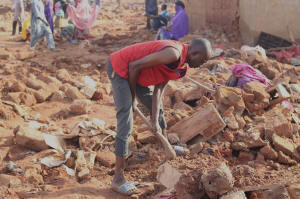|
Torrents of predawn rainfall early Thursday unleashed the
devastating flood on Mokwa, nearly 380 kilometers (236 miles)
west of Abuja and a major trading and transportation hub where
northern Nigerian farmers sell beans, onions and other food to
traders from the south.
The deputy chairman of Mokwa Local Government, Musa Kimboku,
confirmed the updated fatality count to The Associated Press on
Sunday. He said rescue operations have been called off, as
authorities no longer believe there are any survivors.
To prevent the outbreak of disease, officials are currently
exhuming bodies buried beneath the rubble, Kimboku added.
On Saturday, the spokesperson for the Niger State emergency
service, Ibrahim Audu Husseini, said an additional 11 people
were injured and more than 3,000 people were displaced.
At least 500 households across three communities were affected
by the sudden and intense flood that built rapidly in about five
hours, leaving roofs barely visible and surviving residents
waist-deep in water, trying to salvage what they could and
rescue others.
Husseini added that two roads were washed away and two bridges
collapsed.
In a statement on Friday night, President Bola Tinubu expressed
condolences and said he had directed the activation of an
emergency response to support victims and “accelerate” recovery.
Flooding is common during Nigeria’s wet season. Communities in
northern Nigeria have been experiencing prolonged dry spells
worsened by climate change and excessive rainfall that leads to
severe flooding during the brief wet season. But this flood has
been particularly deadly in Mokwa, a farming region near the
banks of the River Niger.
Mokwa community leader Aliki Musa said the villagers are not
used to such flooding.
The chairman of the Mokwa local government area, Jibril Muregi,
told local news website Premium Times that construction of
flood-control works was long overdue.
All contents © copyright 2025 Associated Press. All rights
reserved |
|




